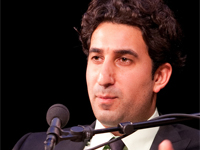Registration
You will receive an email confirming your registration.
As the political firestorm unleashed by Iran’s June 12 presidential elections appears far from over, Carnegie co-hosted a conversation on Iran with PEN American Center, The New York Review of Books, and 92nd Street Y Unterberg Poetry Center. Carnegie’s Karim Sadjadpour, Roger Cohen, who covered the elections for the New York Times, and Haleh Esfandiari of the Wilson Center spoke with Shaul Bakhash about events on the ground over the past month and what might be unfolding behind the scenes.
Key points made by the participants:
- The Obama administration has reached out to Iran as much as is appropriate, with Nowruz greetings and repeated assurances of mutual respect. It’s up to Tehran now to reciprocate the overtures.
- The elections deepened and exposed pre-existing rifts in the political elite, and if the crisis continues it could accentuate fissures in the Revolutionary Guard—more powerful now than the clergy, and a key pillar of Ahmadinejad's strength.
- Khamenei no longer enjoys power without accountability. By allying himself openly with the deeply unpopular Ahmadinejad, he has forsaken his role as spiritual arbiter above the political fray, and revealed the extent to which he controls political events behind the scene.
- Iran cannot return to the pre-election status quo; too many taboos have been shattered and previously sacred red lines crossed. Demonstrators and prominent clerics have questioned not only Ayatollah Khamenei’s authority, but the institution of an unelected Supreme Leader.
- No matter how the stand off between the opposition and Khamenei evolves, military action is not a viable option. A Western attack on Iran would play into the hardliners’ hands and cement their now-tenuous hold on power.
- The regime only allowed the uncharismatic Mousavi to run assuming he could not mount a serious challenge. The eleventh-hour surge of support for Mousavi panicked the normally methodical Iranian leadership, who committed what amounted to a coup in favor of Ahmadinejad.
Sadjadpour concluded:
“The government which has taken over Iran is a cartel. It’s representative of a very narrow swath of not only Iranian society but also the Iranian political elite. [This group] made $300 billion the last four years on oil revenue. They’re not going to give it up that easily. They don’t want Iran to open up to the international community, to join the WTO, and have the great oil companies of the world invest in Iran, and for Iran to become more meritocratic. On the contrary, they think, the less the merrier. Their ideological enmity towards the United States cloaks a marriage between power and greed, essentially; their power and economic clout is much better preserved in isolation or by retaining this adversarial relationship with the United States.”
This event was co-sponsored by the Carnegie Endowment, PEN American Center, The New York Review of Books, and 92nd Street Y Unterberg Poetry Center.
